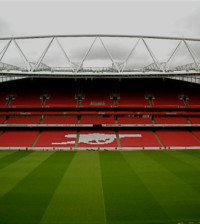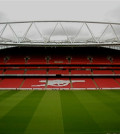- Arsenal battling with PL rivals to sign Joao Gomes
- Arsenal in ‘pole position’ to sign Wolves ace Matheus Cunha
- Arsenal eye Dusan Vlahovic as striker plans summer move
- Arsenal and Chelsea set sights on Barcelona Midfielder
- Arsenal make contact to sign Frankfurt star Hugo Larsson
- [Player Ratings] Arsenal 2-1 Fulham: Saka returns but Martinelli shines
- Arsenal hold ‘concrete talks’ to sign Bayern star Leroy Sane
- Arsenal predicted team against Fulham
- Arsenal working on new deal for Bukayo Saka
- Arsenal developing ‘strong interest’ in Viktor Gyokeres
The Good and Bad Legacy of David Dein

English club needs American billionaire to save it from Russian gangster.
Along with the release of the Financial Report last week, the club also announced that Stan Kroenke had been named a non-Executive Director of Arsenal Holdings plc. The official press release/letter sent out last Friday to shareholders (not the media) read:
It has been announced today that E. Stanley Kroenke has accepted the Board’s invitation to become a director of Arsenal Holdings PLC (”Arsenal”) as a Non-Executive Director. […] Mr Kroenke fully supports the approach the Board has taken in setting the direction of the Club. […]
Mr Kroenke, and any person who has acted in concert with him or any person who is subsequently acting in concert with him, reserves the right to increase his shareholding beyond 29.9% of Arsenal’s issued share capital within twelve months, and to take any other action which would otherwise be precluded under Rule 2.8 of The City Code on Takeovers and Mergers, with the agreement of the Board of Arsenal or following the announcement of an offer or possible offer for Arsenal or if there is a material change of circumstances. Mr. Kroenke is not a party to the lockdown agreement which was signed by the other directors of Arsenal in October 2007.
So what does all this mean? Well, basically, that the club sees Kroenke as its safeguard against a Red & White Holdings takeover. It means that Kroenke could attempt to acquire the necessary 30% of shares “with the agreement of the Board of Arsenal”. When one shareholder reaches 30% they are required by law to launch a takeover bid. If the Board do not agree to the takeover, then it becomes a “hostile takeover” and the shareholder must then try to acquire the necessary amount of shares to hold a majority. The Board or shareholders can refuse to sell their shares and the “hostile takeover” would fail.
What the statement above is saying is that Kroenke can do this “following the announcement of an offer or possible offer for Arsenal or if there is a material change of circumstances”, i.e. if Usmanov gains or looks likely to gain 30% of shares himself and launch a “hostile takeover”. This would give Kroenke the permission (and support) of the Board to attempt a takeover as well in the hopes that shareholders who are keen to sell would rather sell their shares to the Board-approved Kroenke rather than the Russian gangster.
And we can all thank our good friend, David Dein, for the current state of affairs. A little background: Dein brought in Kroenke in the hopes that he would buy or takeover the club and install him as Chairman. The Board rightly dismissed Dein as his intentions became clear and he openly defied the board. Then, when it became apparent that Kroenke had no interest in buying the club outright or attempting a hostile takeover, Dein was forced to go find another sugar daddy in his attempt to gain power at the club. His desperation for power led him to an “alliance” with Alisher Usmanov, a shady Russian gangster/billionaire who has spent time in jail. Usmanov, knowing Dein’s weakness (his desire for power), “convinced” Dein to sell him all the shares he still held in Arsenal for 75m pounds.
Following the sale, Dein was named Chairman of Red & White Holdings. The deal was obvious: Usmanov would name Dein Chairman of Arsenal when he took over if Dein would sell him his shares. Dein sold the club out in a bid for personal power. This is not a man who “cares about the club.” Now over a year later, Usmanov realized what a polarizing figure Dein is, not only among the Board members but also the supporters, and he was relieved of his chairmanship at Red & White. It now appears that Usmanov has softened on his desire to control the club, as reported by The Guardian last week. However, we’ve seen pieces like this by “friendly” journalists before. The article reads:
Alisher Usmanov will step aside and allow Stan Kroenke to take over Arsenal without a fight once the current shareholder-directors decide to sell up. Both suspect that Danny Fiszman, the most powerful individual on the Arsenal board, is setting up an auction for the day when he cashes in on his 24.11% stake. But Usmanov would prefer to be a sleeping investor rather than fight Kroenke for the club. Kroenke’s relationship with the Arsenal board is clearly better developed than Usmanov’s, as evidenced by the American’s co-option as a director last Friday.
This could be the reason for Dein’s dismissal or it could be a maneuver on Usmanov’s part. With Fiszman controlling more than enough shares to set either Kroenke or Usmanov over the 29.9% threshold, his actions in the near future become crucial. Fiszman hasn’t made any public statements or shown any signs that he is looking to sell his interest in Arsenal Holdings plc, but that could change when the lockdown agreement expires in October 2011. Either way, not too long from now, the entire future of the club will hang in the balance.
In this way, Dein is still shamefully affecting the club in adverse ways even after he has left Arsenal, and now Red & White, as the club hopes to use the first billionaire sugar-daddy he brought in who turned out only to be a smart businessman looking to make a smart investment, against Dein’s second billionaire sugar-daddy who turned out to be an ex-con gangster who swindled him out of his shares and then dumped him by the side of the road. These are two very disturbing miscalculations by Dein and prove just how much his desire for ultimate control of Arsenal distorted his judgment and the lengths he was willing to go to achieving his own personal goal at the expense of the club, its tradition, and its supporters.
Undeniably, the man did some good while he was with the club (and some bad – remember Champions League matches at Wembley?), but his hunger to be the “top dog” at Arsenal led him to do the absolute worst thing he could once he left. Dein deserves what he gets for his betrayal, but Arsenal Football Club and its loyal supporters certainly don’t.








7 Comments